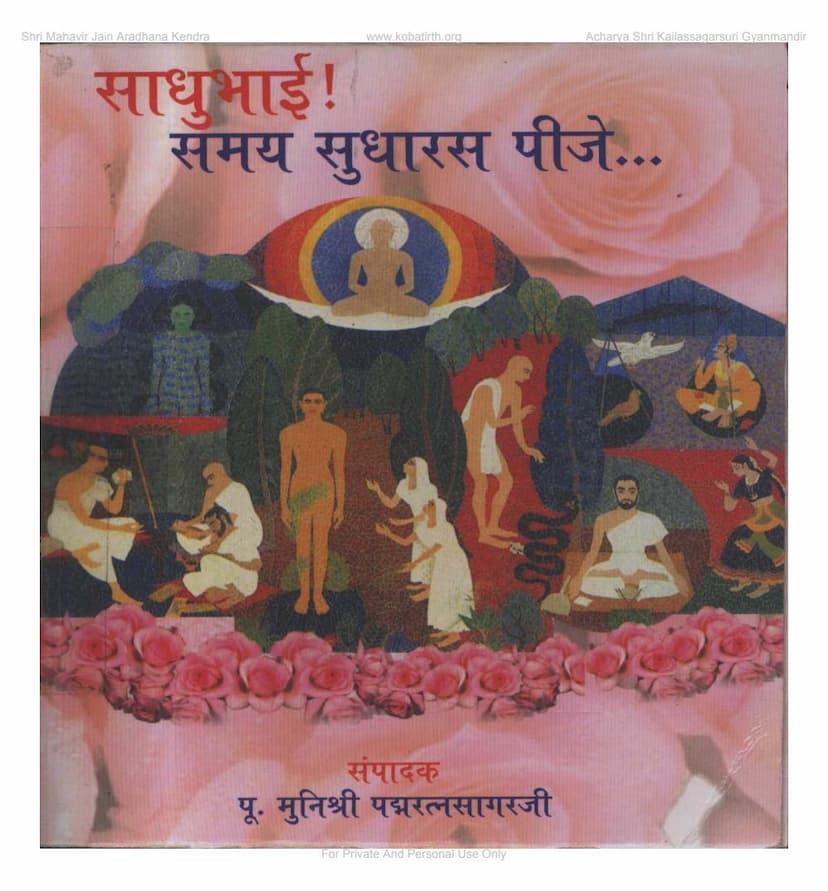Sadhubhai Samaya Sudharas Pije
Added to library: September 2, 2025

Summary
Here's a comprehensive summary of the Jain text "Sadhubhai Samaya Sudharas Pije" (साधुभाई समय सुधारस पीजे), edited by Shri Padmaratnasagarji:
Book Title: Sadhubhai Samaya Sudharas Pije (साधुभाई समय सुधारस पीजे) Author(s): Padmaratnasagar (Padmaratnasagarji) Publisher: Mahavir Jain Aradhana Kendra Koba Catalog Link: https://jainqq.org/explore/008932/1
Overview:
"Sadhubhai Samaya Sudharas Pije" is a collection of Sajjhayas (or Sajjhay), which are devotional songs or verses in Gujarati, often used for spiritual contemplation and singing within the Jain tradition. The title itself translates to "O Monk Brother, Drink the Nectar of Time," emphasizing the importance of utilizing time for spiritual growth and realization. The book is a compilation of various Sajjhayas, covering a wide range of Jain philosophical concepts, stories of revered saints and ascetics, and guidance for ethical living.
Key Themes and Content:
The book is structured as an anthology of Sajjhayas, each focusing on different aspects of Jain Dharma and spirituality. The content can be broadly categorized as follows:
-
Introduction and Blessings: The initial pages contain blessings and dedications from esteemed Jain Acharyas, including Acharya Shri Buddhisagar Surishwarji Maharaj, Acharya Shri Kailassagarsuri Maharaj, and Acharya Shri Padmasagar Surishwarji Maharaj. This sets a spiritual tone and highlights the lineage of guidance.
-
The Concept of Sajjhay: The preface explains the significance of the term "Sajjhay" in Jainism. It emphasizes that Sajjhay, closely related to "Swadhyay" (self-study), is the process of understanding and realizing one's true self (Atma Tattva). It also mentions how these Sajjhayas were created by great Maharishis by structuring profound teachings into beautiful verses.
-
Categorized Sajjhayas: The book is meticulously organized with an index of numerous Sajjhayas, each dedicated to specific themes or historical figures. Some of the prominent categories and themes include:
- Temporal Significance: Sajjhayas related to specific days of the lunar month ("Bij Tithi," "Panchmi Tithi," "Ashtami Tithi," "Ekadashi") highlight the importance of observing rituals and reflecting on time's passage.
- Festivals and Observances: Sajjhayas for "Paryushan Parva" (the main Jain festival of repentance) and "Pratikraman" (a ritual of confession and atonement) are included, emphasizing their importance in spiritual purification.
- Great Saints and Their Lives: The collection features Sajjhayas dedicated to the inspiring lives and teachings of numerous historical Jain figures, including:
- Aranik Muni
- Bahubali
- Prasannachandra Rajarshi
- Meghkumar
- Sthulibhadra
- Jambuswami
- Gajsukumar
- Ranehmi
- Vijay Sheth-Vijay Shethani
- Krishna Ranee
- Nandishena Muni
- Vajraswami
- Khandak Muni
- Kuragadu Muni
- Anathi Muni
- Draupadi (Kadva Tumbda)
- Devananda
- Manorama sati
- Chandan Balaka
- Heer Vijay Suri
- Metaraji Muni
- Dhanna-Shalibhadra
- Dhanna Angar
- Philosophical and Ethical Teachings: Many Sajjhayas delve into core Jain principles:
- The Self (Atma): Teachings on self-realization, the nature of the soul, and understanding the "Atma Swabhav" (inherent nature of the soul).
- Virtues and Vices: Sajjhayas on "Dan" (charity), "Shil" (chastity/virtue), "Tap" (austerity), "Samayik" (equanimity), "Samata Bhav" (equanimity), "Vairagya" (detachment), and the pitfalls of "Krodh" (anger), "Man" (pride), "Maya" (deceit), "Lobh" (greed), "Ninda" (criticism), "Swartha" (selfishness), and "Maya" (illusion).
- Karma and Liberation: Discussions on the workings of karma, the consequences of actions, and the path to liberation ("Moksha").
- The Stages of Life: The "Panchgati" (five states of existence) and the concept of "Manushya Bhav" (human birth) as a precious opportunity.
- Six Periods of Time: The "Chhatha Ara" (sixth era) is discussed, highlighting its challenging nature.
- The Nine Planets (Navpad): The significance of "Navpad" is explored, often in the context of devotion and spiritual practice.
- The Navkar Mantra: The central importance of the Navkar mantra is highlighted.
- The Seven Vices (Saat Vyasan): A Sajjhay is dedicated to warning against the seven major vices.
- Aashatana (Offenses): A detailed section on various offenses to be avoided in religious practice.
- Bhakti (Devotion): The collection includes several "Bhajans" (devotional songs) that express love and devotion towards the Tirthankaras and spiritual leaders, reinforcing the importance of Bhakti in the spiritual journey.
-
Compilation and Editing: The book is presented as a compilation by Muni Shri Punitpadmasagarji, with editing by Muni Shri Padmaratnasagarji. The language is generally accessible Gujarati, making these profound teachings relatable to a broader audience.
Purpose and Impact:
"Sadhubhai Samaya Sudharas Pije" serves as a guide for Jain followers, encouraging them to:
- Cherish and Utilize Time: The central theme is to make the most of human life by engaging in spiritual practices and contemplation.
- Understand and Practice Jain Principles: The Sajjhayas offer insights into the core tenets of Jainism, from ethics and virtues to the ultimate goal of liberation.
- Draw Inspiration from Exemplary Lives: The stories of saints and great souls provide motivation and a roadmap for spiritual progress.
- Cultivate Devotion and Detachment: The book balances the importance of devotion (Bhakti) with the necessity of detachment (Vairagya) from worldly pleasures and attachments.
- Purify the Mind and Actions: Through the singing and reflection on these Sajjhayas, individuals are encouraged to purify their thoughts, words, and deeds.
In essence, "Sadhubhai Samaya Sudharas Pije" is a devotional treasury that aims to enrich the spiritual life of Jain practitioners by providing accessible, inspiring, and philosophically profound verses for daily contemplation and devotional singing.